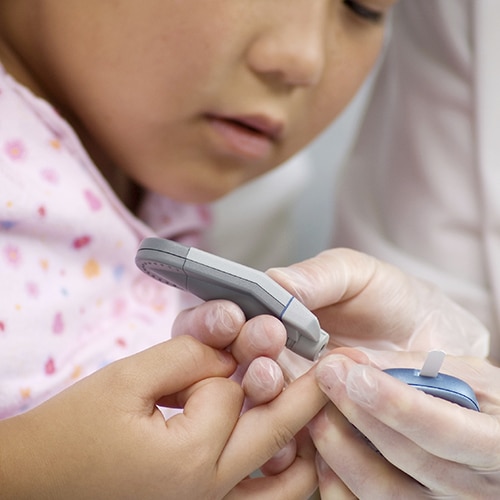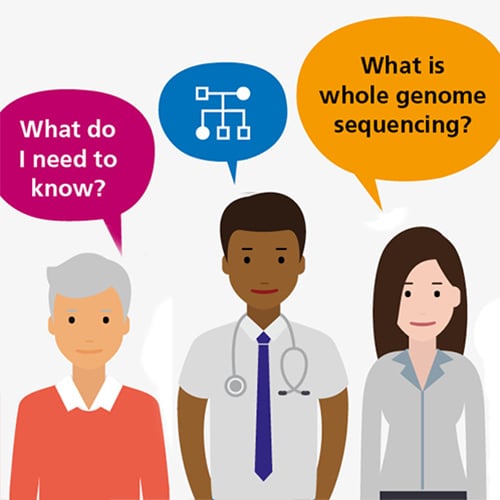NHS England’s Genomics Education Programme exists to deliver and advise on learning and development opportunities that prepare current and future NHS professionals to make the best use of genomics in their practice.
Rapid advances in technology and understanding mean that genomics is now more relevant than ever before. As genomics increasingly becomes a part of mainstream NHS care, all healthcare professionals, and not just genomics specialists, need to have a good understanding of its relevance and potential to impact the diagnosis, treatment and management of people in our care.
In 2014, Health Education England (HEE) launched a four-year £20 million Genomics Education Programme (GEP) to ensure that our 1.2 million-strong NHS workforce has the knowledge, skills and experience to keep the UK at the heart of the genomics revolution in healthcare.
Funding for the programme has since been extended to enable us to continue our work in providing co-ordinated national direction of education and training in genomics and developing resources for a wide range of professionals.
The GEP’s objectives are:
- Prepare the workforce to deliver the new England-wide NHS Genomic Medicine Service.
- Support the completion of the landmark 100,000 Genomes Project.
- Provide the best education opportunities in genomics for the NHS workforce.
- Develop strategic collaborations to keep the UK at the forefront of genomics in healthcare.
The GEP has developed a broad range of educational resources, from informal learning to formal qualifications. The Master’s in Genomics Medicine framework is designed to be delivered as a full Master’s degree, a postgraduate diploma or certificate, or as standalone modules. More than 3,000 people across all professional groups in the NHS have studied at least one Master’s module, thus increasing genomic knowledge throughout the healthcare system.
In addition, the programme has delivered a wide range of short online courses and interactive sessions; factsheets and guides; games, videos, animations and infographics for learning and teaching; and expert-led workshops and events.
The GEP has also:
- funded education and training leads across England;
- launched postdoctoral, doctoral and secondment research fellowships with £1.3 million funding to develop scientific and clinical expertise within the NHS; and
- engaged with a range of professional groups, including nurses and midwives, biomedical scientists and primary healthcare professionals.
Following the findings of the government-commissioned Topol Review, which looks at how digital technologies including genomics are likely to impact on patients, clinicians and the NHS over the next 20 years, the GEP will be instrumental in delivering its recommendations.
To support the NHS GMS, we are driving workforce development in genomics alongside establishing and cultivating networks and collaboration, both across the UK and internationally.
The GEP is also working with partners to scope and understand the capacity and capabilities required to deliver the GMS and to look at alternative roles and new ways of working.
Our work
The GEP has taken an innovative and adaptable approach to education in order to reach a diverse and busy healthcare workforce. Watch our animation to get a sense for the importance of genomics in healthcare today and the scope of our work to ensure that NHS professionals have the knowledge, skills and experience to embrace the extraordinary potential of genomics.
Key initiatives
The GEP has instigated, led and contributed to a number of major education and training initiatives since its inception in 2014, some of which are highlighted here.
Collaborations
The Genomics Education Programme collaborates with leading educational and healthcare groups to ensure that genomics is embedded in patient care and treatment across the UK, helping us succeed in our aim of supporting the delivery of a Genomic Medicine Service for the NHS. Read more about our collaborations below.
To ensure the NHS is a world-leading healthcare system in its use of cutting-edge genomic technologies, its workforce needs to be able to harness the power of genomic technologies and science to provide better diagnoses, enhance patient care and personalise treatments.
We provide support to NHS England and NHS Improvement through workforce planning and development, initially ensuring that staff received the necessary training and skills to work on the 100,000 Genomes Project. Our focus is now on helping healthcare staff to develop the required skills to roll out the NHS Genomic Medicine Service across the country.
The GEP collaborates with Genomics England in developing resources to support the delivery of the 100,000 Genomes Project. Funded Master’s students and GEP fellows can join a GeCIP and access 100,000 Genomes Project data for their research project.
Beyond the 100,000 Genomes Project, the GEP continues to work closely with Genomics England as part of its work overseeing the National Genomics Research Library.
The GEP has supported the NHS Sickle Cell and Thalassemia Programme (SCTP) in a project to produce a wide range of new and updated resources for stakeholders, in collaboration with the Sickle Cell Society and the UK Thalassaemia Society.
In January 2021, a live webinar was held to introduce the new publications, and some updates to existing ones, via Microsoft Teams. These included the new Sickle Cell and Thalassaemia Counselling Knowledge and Skills Manual, and newly produced haemoglobinopathy carrier leaflets from the screening programme. The Sickle Cell Society showcased a radically revised Parent’s Handbook and Paediatric Standards document.
Post-webinar resources are available here:
- Presentation slides from the webinar.
- Event Q&As.
- A complete video recording of the webinar.
Objectives and aims
In line with the objectives of the SCTP, the webinar aimed to contribute to the continued improvement of screening services, and of the experience of patients and their families by:
- informing SCTP’s stakeholders about the latest resources for use in their practice;
- updating stakeholders on recent developments within the programme, within screening and within PHE;
- reflecting on the patient experience of screening;
- offering a platform for any questions and comment from stakeholders and promoting discussion about screening, using regular Q&A sessions, together with Menti polling throughout the event;
- engaging with stakeholders along the screening pathway; and
- promoting and celebrating the work of the programme and its partners.
Professor Dame Elizabeth Nneka Anionwu DBE CBE FRCN FQNI PhD chaired the event. The speakers included patient representatives sharing their experiences of life with sickle cell and with thalassaemia, leading voluntary society representatives, clinical and laboratory advisers to the screening programme, and screening programme team members.
The webinar was aimed at anyone involved in screening for sickle cell disease or thalassaemia, or in supporting families during screening and beyond. More than 400 health professionals, educators and voluntary sector workers registered to attend.
A joint venture with NHS England, the Academy of Medical Royal Colleges Genomic Clinical Leads Group brings together expertise across the medical, surgical and associated specialties to inform education and training priorities.
The GEP is a key member of this group and provides expertise and direction to ensure the education and training needs of the NHS Genomic Medicine Service are reflected.
The GEP works with the Royal College of General Practitioners to progress the genomics agenda for primary care.
This includes reviewing and providing expert input into the GP training curriculum, the development of educational and training resources for GPs and advising on the content of relevant policy documents.
Led by Macmillan Cancer Support, this group brings together representatives from a range of cancer charities to ensure consistency in the information provided to patients and their families about genomics in cancer care.
The GEP provides education and information for the cancer charities to disseminate to their members. In addition, the GEP will oversee the development of cancer nurse genomic champions, a network that provides a point of contact for patients and their families.
The GEP has provided support to the Genomics in Mainstream Medicine Working Group, which was set up to raise awareness about genomic medicine across a range of specialties. The group was established by the Joint Committee for Genomics in Medicine of the Royal College of Physicians, the Royal College of Pathologists and the British Society for Genetic Medicine.
Part of the group’s work includes the production of factsheets outlining the context and impact of genomics on key clinical specialisms.
- Audiovestibular and genomics
- Cardiovascular and genomics
- Dermatology and genomics
- Endocrinology and genomics
- Gastroenterology and genomics
- General practice and genomics
- Medical oncology and genomics
- Nephrology and genomics
- Neurology and genomics
- Ophthalmology and genomics
- Paediatrics and genomics
- Pathology and genomics
- Public health and genomics
- Respiratory and genomics
- Rheumatology and genomics
For more information about the group’s activities, visit PHG Foundation.
The Australian Genomics Health Alliance comprises a national research collaboration of clinicians, researchers and diagnostic geneticists working together to provide evidence for the equitable, effective and sustainable delivery of genomic medicine in healthcare.
The GEP is a key collaborator in this work, providing expert input and piloting resources to ensure they are fit-for-purpose for NHS professionals.
The GEP works with seven Russell Group HEIs (higher education institutions) across England, which are commissioned to deliver the Master’s in Genomic Medicine framework to a national curriculum.
The GEP provides support for the HEIs in driving forward innovative and creative ways in which to deliver genomic education to NHS staff. The HEIs work together as a network and share good practice and resources. There is also scope for innovation among HEIs to develop additional modules to enhance the Master’s coverage of genomics.
Meet the team

Ben Armstrong
Project Editor
Ben supports the content development team in curating, editing and publishing the programme’s wide range of educational content, as well as assisting with the team’s communications activity. Having previously worked as a technical author, magazine editor and content writer, Ben brings a variety of writing and editing skills and experience to the GEP. He holds a BA in English Literature from the University of Warwick and is a published author of poetry.
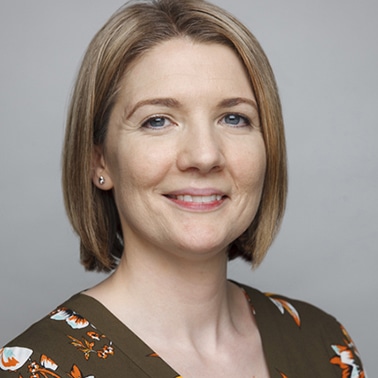
Claire Healy
Project Co-ordinator
Claire co-ordinates various projects within the programme. She manages the funding applications for the genomics Master’s framework, and supports Charlotte on a job-share basis with the co-ordination of the GeNotes project, ensuring high levels of engagement with external stakeholders. Claire has more than 18 years’ financial services experience within the private sector. She is proud to be working for the NHS within Health Education England.

Áine Kelly
Managing Editor
Áine leads the programme’s editorial team, overseeing the commissioning and development of a wide range of educational projects, as well as supporting the programme’s communications activity. Áine brings two decades of editorial experience to the programme, having previously worked as managing editor on business-sector magazines and websites.
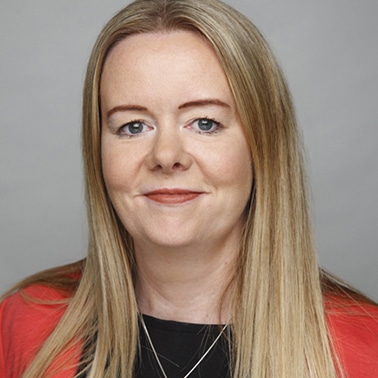
Kathleen Lynch
Project Manager
Kathleen project manages a range of initiatives in the programme, most notably the genomics Master’s framework, extracting data and undertaking analysis for various national and regional reports. Kathleen manages the contracts, business cases, finance and budget for the GEP, ensuring delivery of priorities within HEE governance. She has worked in the NHS and public health for the past decade.

Amelia McPherson
Editor
Amelia is an experienced editor and producer, bringing a passion for multimedia, and especially audio-visual content, to the team. She delivers a wide variety of projects, working with subject matter experts, collaborators and production teams to bring educational resource ideas to fruition in the form of online courses, films, animations, articles, graphics, audio recordings and more.

Dr Ed Miller
Senior Education & Development Officer
Ed provides scientific and educational support for the development of resources and works closely with the editorial team. He also supports the programme with its wider NHS workforce transformation work. Ed holds a PhD in DNA damage and repair from the University of Birmingham. During his time as a researcher, he gained valuable experience in science communication and public engagement.
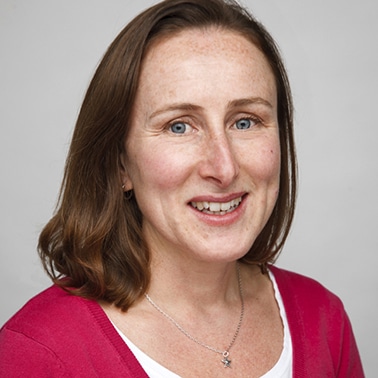
Charlotte Murray
Stakeholder Engagement Manager
Charlotte manages the programme’s communications and engagement activity. She promotes our work across HEE, the wider NHS and with professional partners, raising awareness of the courses, resources and funding available for all healthcare professionals keen to learn about genomic medicine. Charlotte has more than 15 years’ experience managing PR and communications activity.

Alison Pope
Deputy Director
Alison leads the team in the delivery of key objectives in genomics education for HEE. During her 25-year NHS career, Alison has worked across a range of healthcare organisations in both acute and primary care sectors and at national, regional and local level in the field of health education and workforce transformation. In 2009, she joined the West Midlands Strategic Health Authority to lead on a strategy to embed technology-enhanced learning across the region. Alison later led the award-winning ‘Come Back to Nursing’ campaign to encourage former nurses back to the profession.
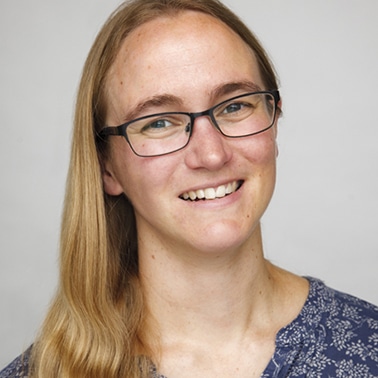
Dr Siobhan Simpson
Senior Education & Development Officer
Siobhan brings scientific, educational and analytical skills to the team. She works across a range of projects, developing educational resources and analysing data. She has a research background in genetics with Master’s degrees from the University of Edinburgh and the University of Kent, and a PhD from the University of Nottingham.
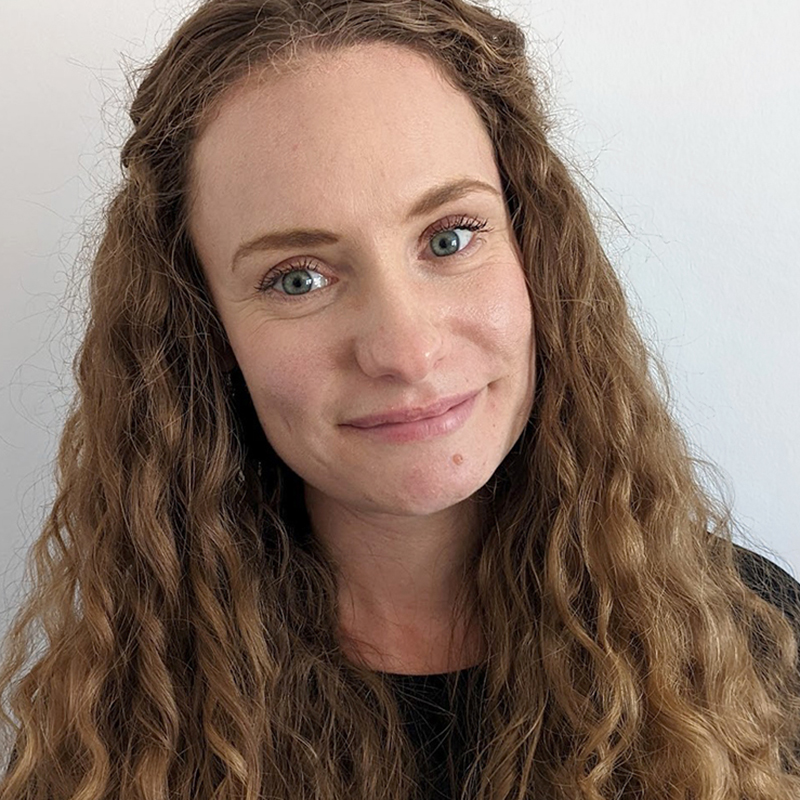
Louise Summerling
Project Editor
Louise supports the planning, commissioning, writing, editing and publishing of a wide range of educational and awareness-raising content. With more than seven years’ editorial and communications experience across a variety of sectors, including academic publishing, early-stage start-ups and national charities, she brings a broad range of writing and editing skills to the programme.

Charlotte Szczepanik
Project Co-ordinator
Charlotte job shares with Claire, co-ordinating various project within the programme. She manages the co-ordination of GeNotes working groups and associated activity, liaising with external stakeholders and ensuring that the project is delivered successfully. She supports operational tasks across the team and has more than 14 years’ experience, having worked at the Department of Work and Pensions, a local authority, and now six years with the NHS.

Professor
Kate Tatton-Brown
Clinical Director
As well as leading the Genomics Education Programme, Kate is a consultant in clinical genetics at St George’s University Hospitals NHS Foundation Trust and professor in clinical genetics and genomic education with St George’s, University of London. She is also involved in many genomics research projects and leads an international study to investigate the genetic causes of conditions associated with learning disability and increased growth. Kate is a fellow of the Royal College of Physicians and a senior fellow with the Higher Education Academy. In 2021, she was awarded a National Teaching Fellowship.

Elliott Williams
Project Editor
Elliott provides editorial support across the programme’s educational and communications activity. He previously worked for four years at an open-access academic publisher overseeing editorial projects and holds a Master’s degree in molecular genetics. He brings with him a passion for science communication and community engagement.
Contact us
Get in touch with the programme team by post, email or social media.
Developing people
for health and
healthcare





